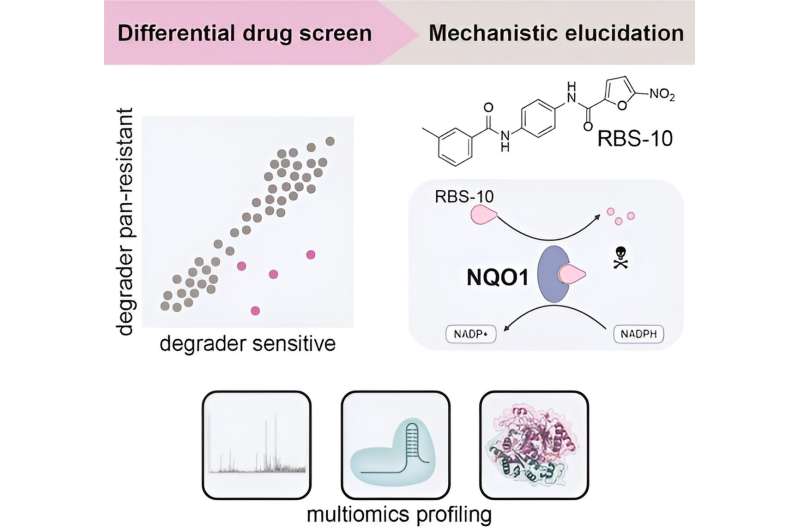This article has been reviewed according to Science X's editorial process and policies. Editors have highlighted the following attributes while ensuring the content's credibility:
fact-checked
peer-reviewed publication
proofread
New drug reveals a key mechanism to overcome resistance to protein degraders

Protein degraders, a novel approach in drug discovery, show promise in tackling diseases previously thought to be untreatable. Unlike traditional drugs that block specific protein functions, degraders alter the cell's natural degradation process so that it can remove disease-relevant proteins. However, resistance to these degraders is still an unsolved issue.
A recent study led by Dr. Cristina Mayor-Ruiz and Dr. Antoni Riera at IRB Barcelona and published in Angewandte Chemie International Edition has made significant progress towards understanding and combating resistance to these innovative drugs.
Overcoming resistance: A persistent challenge in cancer treatment
The development of resistance to cancer treatments is a significant obstacle for the effective management of the disease. Because cancer cells reproduce quickly, they can adapt and become resistant to drugs over time, thereby rendering treatments ineffective. This issue is particularly problematic with protein degraders, which show great promise but are also susceptible to resistance.
In their study, the researchers tackled this challenge using the cellular model most resistant to protein degraders known to date. Their primary goal was to find a drug capable of specifically targeting and eliminating these resistant cells.
After an extensive chemical screening and optimization process, the team identified a drug named RBS-10 that can selectively remove resistant cells and thus emerges as a promising solution to this pressing issue.
NQO1: An actionable vulnerability in resistant cells
To better understand how RBS-10 exerts its effects, the researchers delved into its mechanism of action. Using chemoproteomics, they pinpointed the enzyme NQO1 as the primary target of RBS-10. Interestingly, the resistant cellular model showed a significant increase in NQO1 expression. Further analysis through proteomics, metabolomics, and genetic approaches revealed interesting information: RBS-10 acts as a prodrug. This means that it is activated only after its metabolism by NQO1 in resistant cells.
"We felt like 'molecular detectives' in this project, making use of a repertoire of chemical biology approaches to discover that RBS-10 works as a prodrug. Our discoveries not only provide valuable molecular insights into RBS-10's mechanism of action but also have potential implications for the development of future therapies," commented Dr. Mayor-Ruiz.
As protein degraders continue to progress towards clinical applications, understanding resistance mechanisms is crucial. "Importantly, drugs in pre-clinical and clinical stages that work like RBS-10 may hold the key to addressing resistance to protein degraders in clinical settings," concludes Dr. Riera.
More information: Bárbara M. G. Barbosa et al, Discovery and Mechanistic Elucidation of NQO1‐Bioactivatable Small Molecules That Overcome Resistance to Degraders, Angewandte Chemie International Edition (2023). DOI: 10.1002/anie.202316730
Journal information: Angewandte Chemie International Edition
Provided by Fundació Institut de Recerca Biomèdica (IRB BARCELONA)





















